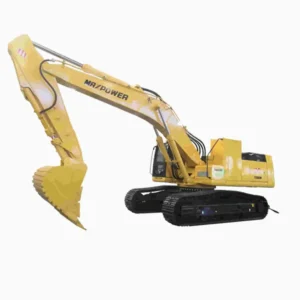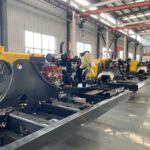Introduction
When it comes to construction and excavation projects, having the right equipment is essential for efficiency and productivity. One such piece of equipment that has gained popularity in recent years is the 2 ton excavator. This versatile machine offers numerous advantages for various applications, making it a valuable asset on construction sites, landscaping projects, and more. In this article, we will delve into the details of the 2 ton excavator, exploring its features, benefits, uses, and factors to consider before making a purchase.
What is a 2 Ton Excavator?

A 2 ton excavator, also known as a mini excavator, is a compact construction machine designed for excavating, digging, and lifting tasks. It is typically smaller in size compared to larger excavators and is known for its maneuverability and versatility. The term “2 ton” refers to its approximate operating weight, which can vary slightly depending on the specific model and attachments.
The Benefits of Using a 2 Ton Excavator
Using a 2 ton excavator brings a multitude of benefits that make it an invaluable asset in the construction and excavation industry. Let’s delve deeper into these advantages to understand why opting for a 2 ton excavator can significantly enhance your project efficiency and productivity.
- Maneuverability and Versatility: One of the primary benefits of a 2 ton excavator is its compact size, which allows for excellent maneuverability. It can easily navigate through tight spaces, making it ideal for urban construction sites or projects with limited room. Additionally, its versatility shines through as it can effortlessly tackle various tasks, from digging trenches to grading and leveling terrain.
- Reduced Ground Disturbance: The lightweight nature of a 2 ton excavator significantly minimizes ground disturbance during operation. This is particularly advantageous when working on sensitive or established landscapes where preserving the integrity of the surrounding environment is crucial. With reduced ground disturbance, there is a lower risk of damaging existing structures or causing unnecessary disruption to the surroundings.
- Fuel Efficiency and Cost Savings: 2 ton excavators are known for their exceptional fuel efficiency. Compared to larger excavators, they consume less fuel while delivering impressive performance. This fuel efficiency translates to cost savings over time, as you’ll spend less on fuel consumption during your projects. Moreover, their smaller size allows for easier transportation, saving both time and money when moving the excavator between job sites.
- Increased Productivity: Despite their smaller size, 2 ton excavators offer remarkable productivity. Their advanced hydraulic systems enable efficient digging, lifting, and loading capabilities, ensuring that tasks are completed swiftly and effectively. The precise control and responsiveness of these machines allow operators to work with accuracy and achieve high levels of productivity, ultimately saving valuable time on the job.
- Ease of Operation: Operating a 2 ton excavator is relatively straightforward, making it an attractive option for both seasoned professionals and those new to construction equipment. These machines are designed with user-friendly controls and ergonomic features that prioritize operator comfort and ease of use. With proper training and familiarization, operators can quickly master the excavator’s functions, maximizing efficiency and minimizing downtime.
- Enhanced Safety: Safety is of utmost importance on any construction site, and 2 ton excavators prioritize operator safety. Manufacturers incorporate various safety features, such as protective structures and systems that prevent accidental movement or tipping. Additionally, the compact size of these excavators allows for better visibility, enabling operators to have a clear view of their surroundings and potential hazards.
- Versatile Attachments: 2 ton excavators can accommodate a wide range of attachments, further expanding their capabilities. Whether you need a bucket for digging, a hydraulic breaker for demolition, or a grapple for material handling, these excavators can easily be equipped with the necessary attachments to suit your specific project requirements. This versatility eliminates the need for multiple machines, saving space and reducing costs.
In summary, the benefits of using a 2 ton excavator are abundant. Their maneuverability, reduced ground disturbance, fuel efficiency, productivity, ease of operation, safety features, and versatility make them an excellent choice for various construction and excavation projects. By opting for a 2 ton excavator, you can achieve optimal results while ensuring cost-effectiveness and operator satisfaction.
Key Features and Specifications
Understanding the key features and specifications of a 2 ton excavator is crucial in making an informed decision about its suitability for your projects. Let’s dive deeper into the details to gain a comprehensive understanding of what sets these machines apart.
- Digging Depth: A 2 ton excavator typically offers a digging depth ranging from 6 to 10 feet. This depth range allows for efficient excavation of trenches, foundations, and other digging tasks. Understanding the required digging depth for your specific projects is essential in determining if a 2 ton excavator is the right choice.
- Reach: The reach of a 2 ton excavator refers to its maximum horizontal distance from the center of rotation to the tip of the arm. Generally, a 2 ton excavator has a reach of 10 to 15 feet, allowing for easy access to a wide area without the need for repositioning. Consider the reach requirements of your projects to ensure that the excavator can effectively reach the desired areas.
- Bucket Capacity: The bucket capacity of a 2 ton excavator typically ranges from 0.1 to 0.3 cubic yards. The bucket capacity determines the amount of material the excavator can handle in a single scoop. It’s important to evaluate the volume of material you’ll be working with and choose a bucket capacity that optimizes productivity while maintaining efficiency.
- Tracks: 2 ton excavators are equipped with tracks instead of wheels, ensuring stability and maneuverability on various terrains. The tracks provide excellent traction, allowing the machine to operate on uneven surfaces or challenging landscapes with ease. Consider the types of terrains you’ll be working on and ensure that the excavator’s tracks are suitable for the conditions.
- Rotating Cabin: Many 2 ton excavators feature a rotating cabin, also known as a swing boom. This design allows the operator to rotate the upper part of the excavator independently from the tracks. The rotating cabin enhances maneuverability and flexibility, especially when working in confined spaces or when precise positioning is required.
- Hydraulic Systems: Hydraulic systems play a vital role in the operation of 2 ton excavators. These systems power the various functions of the machine, including arm movement, bucket operation, and attachment control. Efficient hydraulic systems ensure smooth and precise operation, contributing to increased productivity and operator satisfaction.
- Additional Features: Depending on the specific model and manufacturer, 2 ton excavators may offer additional features to enhance their functionality. These can include auxiliary hydraulic lines for attaching various tools, telescoping booms for increased reach, or zero-tail swing designs that minimize the risk of the excavator’s rear end colliding with obstacles. Assess your project requirements and consider these additional features to determine the most suitable excavator for your needs.
By considering the digging depth, reach, bucket capacity, tracks, rotating cabin, hydraulic systems, and any additional features, you can make an informed decision when selecting a 2 ton excavator. Understanding these key specifications ensures that the machine aligns with your project requirements, maximizing efficiency and productivity on the job site.
Applications and Uses
The versatility of a 2 ton excavator makes it suitable for a wide range of applications. It can be used for digging trenches, excavating foundations, grading and leveling terrain, demolishing small structures, and even for landscaping projects like installing retaining walls or digging ponds. Its compact size and precise control make it a popular choice for residential construction, road repairs, utility installations, and various other projects that require agility and precision.
Factors to Consider Before Buying
Before making the decision to buy a 2 ton excavator for your construction or excavation projects, it’s essential to consider several factors to ensure that you choose the right machine that meets your specific requirements. Let’s delve into these factors in detail to help you make an informed purchasing decision.
- Project Scope and Requirements: Evaluate the scope and nature of your projects to determine the exact specifications and capabilities you need in a 2 ton excavator. Consider factors such as digging depth, reach, bucket capacity, and attachment compatibility. Understanding your project requirements will help you select a machine that can efficiently handle the tasks at hand and contribute to project success.
- Budget: Establishing a budget is crucial when buying a 2 ton excavator. Determine the amount you are willing to invest in the machine, considering not only the purchase cost but also ongoing maintenance, insurance, and operational expenses. It’s important to strike a balance between your budget and the desired features and quality of the excavator to ensure a cost-effective investment.
- New or Used Equipment: Decide whether you prefer to buy a new or used 2 ton excavator. New machines come with the advantage of the latest technology, warranty, and reliability, but they can be more expensive. Used excavators, on the other hand, are more budget-friendly but may require more thorough inspections and potential repairs. Carefully evaluate the pros and cons of each option based on your budget and the specific conditions of the used equipment available.
- Equipment Quality and Condition: Whether you’re considering a new or used 2 ton excavator, thoroughly assess the quality and condition of the machine. For new equipment, research reputable brands and manufacturers known for their durable and reliable products. When buying used, inspect the machine for signs of wear, check the maintenance history, and if possible, request a demonstration to evaluate its performance firsthand. Ensuring the excavator is in good condition will minimize the risk of unexpected breakdowns and ensure its longevity.
- Dealer Reputation and Support: Choose a reputable dealer or seller when purchasing a 2 ton excavator. Look for dealers with a track record of providing excellent customer service, reliable equipment, and after-sales support. A reputable dealer will offer guidance, assist in the selection process, and provide ongoing technical support, spare parts availability, and maintenance services.
- Operator Comfort and Safety Features: Consider the comfort and safety features offered by the 2 ton excavator. Features such as ergonomic controls, adjustable seats, climate control, and sound insulation contribute to operator comfort and reduce fatigue during long hours of operation. Additionally, prioritize excavators with safety features like rollover protection systems, backup cameras, and audible alarms to ensure a safe working environment.
- Resale Value: While purchasing a 2 ton excavator, it’s worth considering the machine’s resale value. Opt for reputable brands and models that hold their value well in the market. This factor becomes particularly important if you foresee the need to upgrade or replace the excavator in the future.
By carefully considering factors such as project scope and requirements, budget, equipment quality and condition, dealer reputation and support, operator comfort and safety features, and resale value, you can make an informed decision when buying a 2 ton excavator. Taking the time to evaluate these factors will ensure that you invest in a machine that aligns with your needs, enhances productivity, and provides long-term value for your construction or excavation projects.
Maintenance and Safety Tips
To ensure the longevity and safe operation of your 2 ton excavator, regular maintenance is crucial. Follow the manufacturer’s guidelines for routine maintenance tasks, such as checking fluid levels, inspecting tracks and undercarriage, and lubricating moving parts. Always perform a pre-start inspection and address any issues promptly. Adhere to safety protocols, wear appropriate personal protective equipment, and provide adequate training to operators to prevent accidents and maintain a safe working environment.
Popular Brands and Models
Several reputable brands offer high-quality 2 ton excavators. Some popular options include models from Caterpillar, Kubota, Bobcat, Yanmar, and Takeuchi. Each brand has its own unique features, attachments, and specifications, so it’s advisable to research and compare different models to find the one that best suits your requirements.
Comparing 2 Ton Excavators with Other Sizes

While a 2 ton excavator offers its own advantages, it’s essential to understand how it compares to other sizes in the excavator range. Larger excavators provide higher digging depths, increased reach, and larger bucket capacities, making them suitable for more substantial construction projects. Smaller excavators, such as micro or compact models, are even more maneuverable but may have limitations in terms of digging depth and reach. Assess the scale of your projects and determine whether a 2 ton excavator is the most appropriate choice.
Rental Options for 2 Ton Excavators
When it comes to acquiring a 2 ton excavator for your construction or excavation projects, rental options provide a flexible and cost-effective solution. Let’s explore the details and benefits of renting a 2 ton excavator to better understand how it can meet your specific needs.
- Cost-Effectiveness: Renting a 2 ton excavator can be a cost-effective choice, especially for short-term or sporadic projects. Instead of investing a substantial amount of capital in purchasing the machine outright, renting allows you to allocate your resources more efficiently. You’ll only pay for the rental duration, saving you from the upfront costs associated with ownership, such as equipment depreciation, maintenance, and storage expenses.
- Flexible Rental Periods: Equipment rental companies offer flexible rental periods for 2 ton excavators to accommodate your project timeline. Whether you require the machine for a day, a week, or a month, you have the freedom to choose the rental duration that aligns with your specific needs. This flexibility ensures that you have access to the equipment exactly when you need it, eliminating the burden of long-term commitments.
- Access to Well-Maintained Equipment: Reputable rental companies maintain their equipment to the highest standards. When renting a 2 ton excavator, you can expect to receive a machine that is well-maintained and in optimal working condition. This saves you the hassle and cost of performing routine maintenance tasks, as the rental company takes care of it for you. By renting, you can rely on the expertise of the rental provider to deliver reliable and efficient equipment.
- No Storage and Transportation Concerns: Owning a 2 ton excavator comes with the responsibility of storing and transporting the machine when it’s not in use. This can be a significant logistical challenge, especially if you have limited storage space or need to transport the equipment between multiple job sites. By opting for a rental, you eliminate the need to worry about storage or transportation logistics. The rental company will deliver the excavator to your desired location and retrieve it once the rental period ends.
- Access to Latest Technology: Rental companies often update their equipment inventory to include the latest models and technologies. Renting a 2 ton excavator gives you the opportunity to work with modern and advanced machines that offer enhanced features and capabilities. This allows you to leverage the latest technology without the need for frequent equipment upgrades or investments.
- Technical Support and Training: Rental companies typically offer technical support and training for the equipment they provide. If you’re new to operating a 2 ton excavator or need a refresher on its functions, the rental company can offer guidance and training to ensure safe and efficient operation. This additional support adds value to the rental experience and contributes to a seamless workflow on your projects.
- Insurance Coverage: Rental agreements often include insurance coverage for the rented equipment. This protects you from potential damages or losses that may occur during the rental period. Before finalizing the rental agreement, carefully review the insurance coverage terms to ensure that you have adequate protection.
Renting a 2 ton excavator offers numerous advantages, including cost-effectiveness, flexible rental periods, access to well-maintained equipment, simplified logistics, access to the latest technology, technical support, and insurance coverage. Evaluate your project requirements and weigh the benefits of renting against the option of purchasing to make an informed decision that aligns with your specific needs and budget.
Conclusion
In conclusion, understanding the key aspects of a 2 ton excavator is vital for making informed decisions regarding its usage and potential purchase. This versatile and compact machine offers numerous benefits for construction, landscaping, and other projects. By considering factors such as its features, applications, maintenance requirements, and comparing different models, you can choose the right 2 ton excavator that meets your specific needs. Embrace the efficiency and productivity that a 2 ton excavator brings to your projects and enjoy the ease of operation and maneuverability it offers.
FAQs
Q1. Can a 2 ton excavator be used for demolition projects?
Yes, a 2 ton excavator can be used for small-scale demolition projects. However, it’s important to ensure that the machine is equipped with the necessary attachments, such as hydraulic breakers or shears, to handle the demolition tasks effectively and safely.
Q2. What is the average fuel consumption of a 2 ton excavator?
The fuel consumption of a 2 ton excavator can vary depending on factors such as the operating conditions, load, and model. However, on average, a 2 ton excavator consumes around 2-3 gallons of fuel per hour.
Q3. Can a 2 ton excavator be used for digging trenches?
Yes, a 2 ton excavator is well-suited for digging trenches. Its compact size and precise control make it easier to navigate and excavate narrow trenches, making it an efficient tool for utility installations or irrigation projects.
Q4. Are there any safety training programs available for operating a 2 ton excavator?
Yes, there are safety training programs available that specifically focus on the operation of excavators, including 2 ton models. These programs provide operators with the necessary knowledge and skills to operate the machine safely and efficiently.
Q5. Can a 2 ton excavator be used for landscaping projects?
Absolutely! A 2 ton excavator is commonly used for various landscaping projects, such as digging ponds, installing retaining walls, or creating garden features. Its compact size allows for precise excavation and maneuverability in tight spaces.






-150x150.webp)
